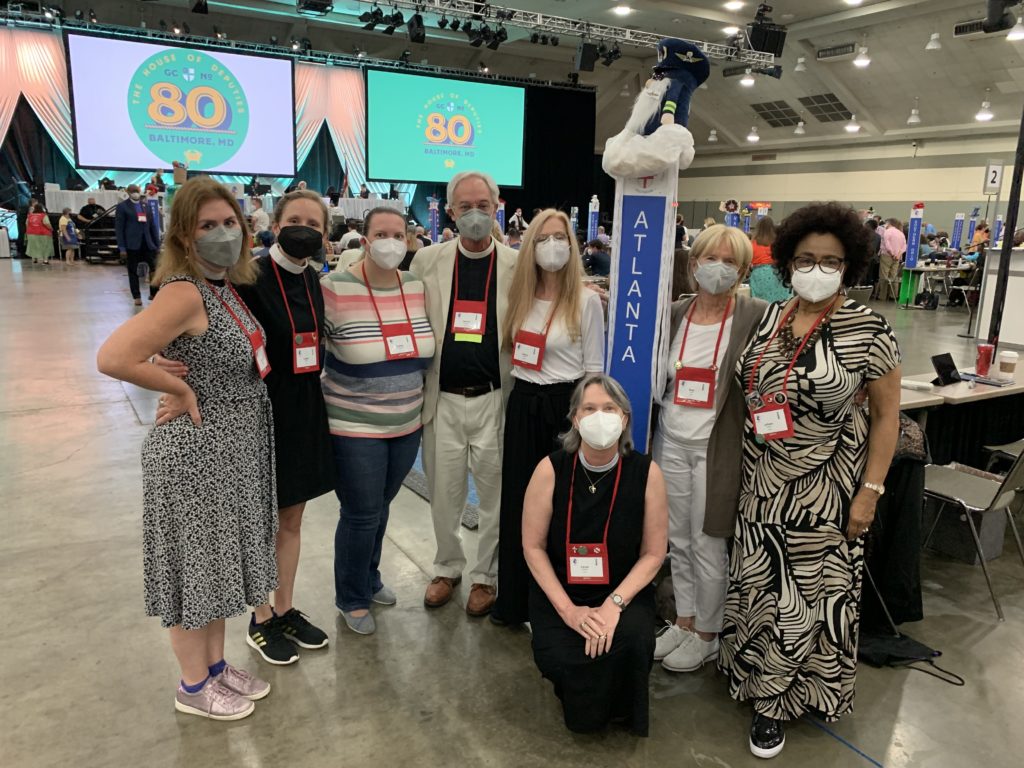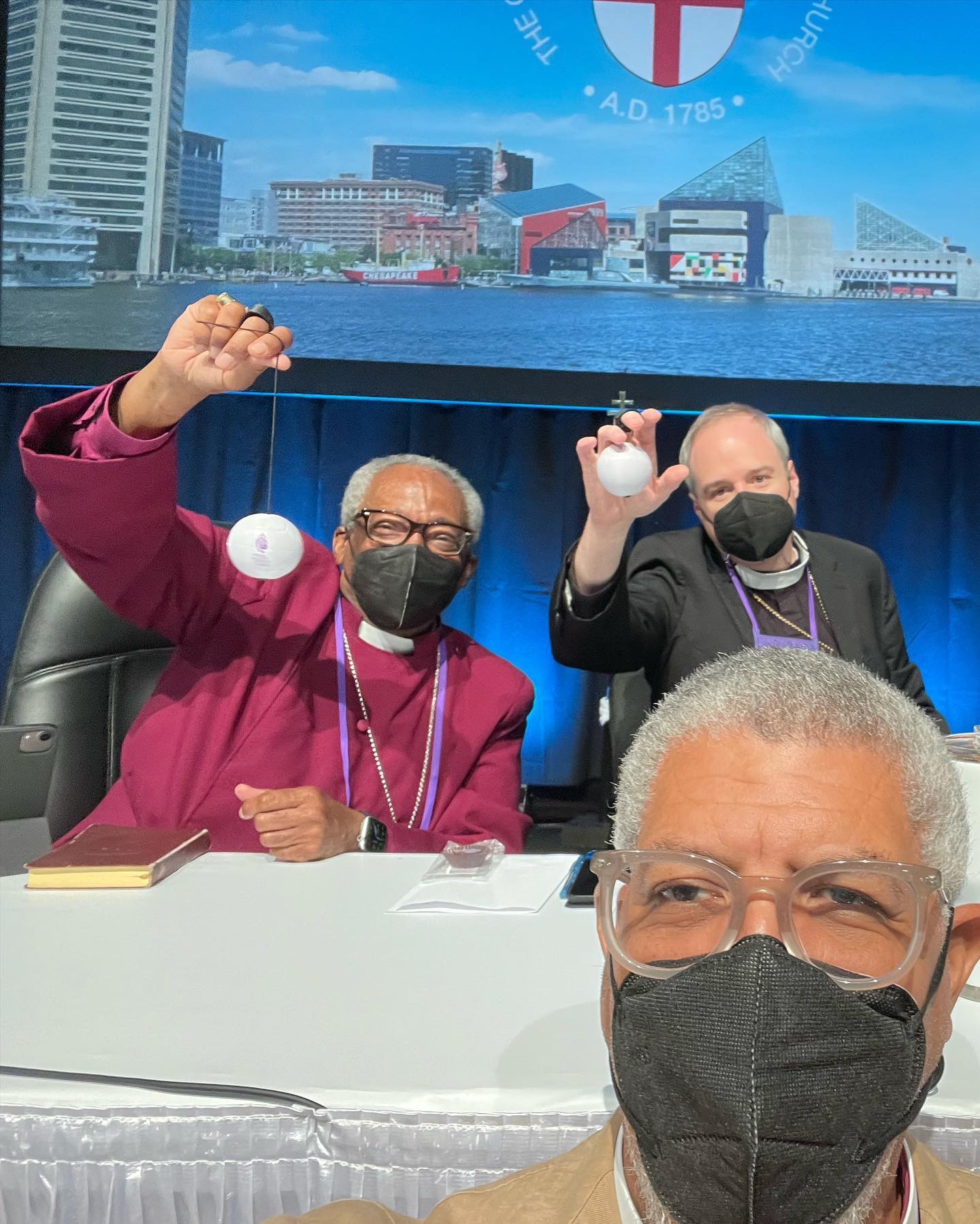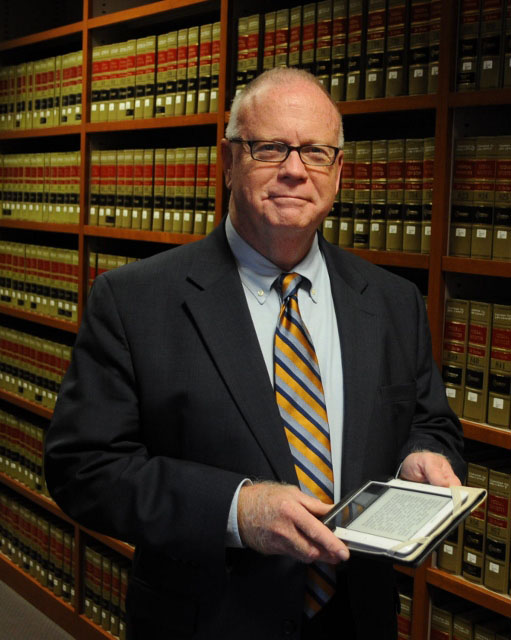
Members of the Diocese of Atlanta deputies to General Convention 80 in Baltimore returned with indelible memories of what by all accounts was a most unusual gathering.
Normally a festival of the church this year’s triennial convention was just the opposite – no packed exhibition hall, elaborate banquets, and multiple social gatherings. But, in response to an uptick in COVID19 cases, General Convention 80 was shortened to four days, had one-tenth the number of attendees and no social gatherings.
First-time deputy Tammy Pallot from Macon said she did extensive preparation for the convention.
“After attending over 50 hours of legislative committee hearings via Zoom and creating a massive Excel spreadsheet to keep track of the 431 resolutions that would be coming before us during our 4 short days together in Baltimore, I was excited and ready to hit the floor running,” Pallot said. But, from the beginning there were unexpected challenges.
“I had to laugh a little when we were only a few minutes into the training session on how to vote with our iPads and everything came to a screeching halt. The network had crashed.”
Beth King of Atlanta, who has attended multiple General Conventions, recalled the gathering as “intense, exciting, frustrating, efficient, again frustrating, celebratory, tedious, compassionate and hurried.”
“However, at the core it was sacred. So many passionate personalities, perspectives and agendas collided, all with the intent of getting our work done in a finite (and abbreviated) number of minutes,” King said after returning from Baltimore.

Bishop Rob Wright shares some Episcopal Diocese of Atlanta swag with Bishop Michael Curry and Bishop Sean Rowe at the 80th General Convention of the Episcopal Church in America.
The Rev. Sarah Fisher was new to the General Convention but expected it to be a larger version of our Diocese of Atlanta Annual Council which she has attended for nearly two decades.
“As a new deputy, there’s such a huge learning curve. I didn’t know or expect that. I figured I’d been doing the Annual Council for 17 years -how different could this be? Trust me–it’s different,” Fisher said. “There’s politics, mixed with the Holy Spirit, mixed with love of the Church and it’s unlike any church gathering I’ve ever attended,” Fisher said by email while heading to vacation.
It was the second Convention for the Rev. Cynthia Park of Gainesville. Both times a first clergy alternate, Park said.
“The most exciting thing to me this time was the emphasis on our common life together and our shared inheritance of the damage the Episcopal church did to the Indigenous peoples of this country between the late 1800’s up to the current generation,” she said.
Park said the changes imposed on Convention by COVID were a microcosm of the past and future of life in a time of the pandemic.
“I look forward to what gifts from our covid years will open for us in the next era of what it looks like to be followers of Jesus of Nazareth,” she said.
First-time deputy Archdeacon Carole Maddux was struck by the diversity of deputies from the 11 countries comprising The Episcopal Church.
“In fact, the convention hall was filled with a huge variety of people—from different places and countries, who spoke different languages, who saw the world through different lenses—but who had this in common: we all loved Jesus, The Episcopal Church, and Her people,” Maddux said.
Among the most important actions by GC80 according to Atlanta delegates:
- Electing Julia Ayala Harris, the first woman of color, as President and The Rev. Rachel Taber-Hamilton, the first Indigenous woman, as Vice President of the House of Deputies,
- Prayer Book Revision,
- Reunion of the Diocese of The Episcopal Church in North Texas with The Episcopal Diocese of Texas, and
- Resolutions acknowledging The Episcopal Church’s complicity in racism.
Deputy Pallot from Macon said she had thought of the Reunion resolution as simply a logical and practical action until Texas Deputy Katie Sherrard rose to speak.
“With fierce tears streaming down her cheeks she spoke of the hurt in 2008 when those who chose to stay in the Episcopal Church were left with 8 churches and 10 priests and the devastation once again in 2022 when the Supreme Court allowed ACNA to leave with all of their property, including their name,” Pallot remembered.
“The pain and power of her testimony was met with a standing ovation as tears streamed down my mask. Our hearts hurt for the people of Ft. Worth, but we stood in awe of their resilience and strength. It was a moment of the Church being the Church. Hundreds of us acknowledging the pain and fortifying Deputy Sherrard and all of the people of Ft. Worth with the love of Christ. It was a holy moment, and I am so grateful for the privilege of being a part of it.”
Rev. Fisher said watching the process of the resolution expanding the Prayer Book beyond the red book in church pews was “fascinating.
“The House of Bishops and House of Deputies taking legislation back and forth, all for the growth and good of the church. In so many ways, this legislation is a microcosm of all the work that was before us: how do we honor, listen to and learn from our history while moving forward into the world that is now.”
Another first-timer, Archdeacon Carole Maddux, who also directs the work of the Georgia Interfaith Public Policy Center, said she was surprised to receive a phone call prior to Convention telling her she had been assigned to a committee.
“I was honored to receive a call from President Jennings early one morning placing me on the Social Justice and US Policy Committee. My experience with GIPPC came in handy!”
11-time deputy The Rev. Canon Sam Candler of the Atlanta deputation received a House of Deputies Medal for his steadfast service as a member of the Standing Committee for Liturgy and Music. He also drew praise for his leadership as chair of the Atlanta delegation.
“I was overwhelmingly grateful for Sam Candler’s leadership,” Rev. Fisher said. “He answered questions, listening genuinely and well, helped deputies make connections with other deputations and generally helped us find our way. And he’s so clearly respected by the House of Deputies -for his wisdom, humility, and humor. He has a great way of being with people that helps empower everyone to do the work before them.”
Rev. Fisher said one of several times she was brought to tears was “Listening to a survivor of an Indigenous Boarding School talk about her experience there and hearing people talk about how the Episcopal Church had been part of that wounding and now has an opportunity to be part of the truth telling that will, hopefully and with God’s help, lead to healing.”
Veteran deputy King said she was also brought to tears by the gut-wrenching testimony of the abuse survivor, but that “I needed to hear it and move to acknowledge that the time for action is long overdue. I bring the mandate of the work ahead home with me to share across our diocese.”
Still, King said, she comes home reassured by the reaction of those attending this most extraordinary session.
“Newbies and veterans alike took it all in stride, never forgetting that masks, daily testing, no smorgasbord of snacks on the tables (my waistline is grateful!), an absence of time to socialize with old and new friends alike, and very long days, was a demonstration of everyone’s care and concern for one another and commitment to the future of the church.
Please thank our deputies for their hard work.
Beth King, The Cathedral of St. Philip
Carole Maddux, St. David’s Roswell
Cynthia Park, Grace Episcopal Church Gainesville
LaFawn Gilliam, St. Luke’s Atlanta
Lauren Holder, Cathedral of St. Philip
Lindsey Hardegree, Cathedral of St. Philip
Mary Caroline Cravens, Cathedral of St. Philip
Sam Candler, Cathedral of St. Philip
Sarah Fisher, St. Catherine’s Marietta
Tammy Pallot, St. Francis Macon

